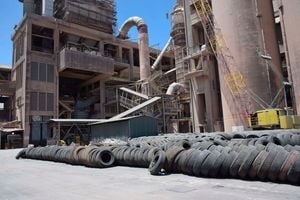
Stranded travellers during a workers' protest against the planned Adani takeover.
The stakes were very high in that botched attempt by the Government to concession Jomo Kenyatta International Airport (JKIA) to the Adani Group of India.
But what did not find adequate articulation in the public furore that ensued were politically charged the undercurrents in the saga, and the fact that the stakes in the plan to concession were even much higher for the multi-million existing businesses at the airport, especially the businesses with leases on airport land.
Here is a little anecdote. In 2023, Kenya Airports Authority (KAA) engaged an international firm and transaction advisers by the name, ALG Consultants, to advise the corporation on the best way to approach the expansion of the airport.
ALG Consultants are no ordinary mortals. They are touted as experts with extensive experience in developing public-private partnership (PPP) projects.
The brief included charting out feasible PPP options for the state-owned company. As is practice in such transactions, KAA created a data room where it placed all existing contracts, loan agreements, existing lease documents and all licence contracts at the disposal of the transaction advisers.
But there was an anti-climax. While perusing the documents in the data room, the consultants discovered that some of the leases and contracts they had wanted to examine had been hidden. In a report published in February, 2024, the consultants stated that the management of KAA flatly refused to give them access to some lease agreements.
This how they put it in their report: “despite our requests we have not received from KAA the list of the ten most material leases for us to review”. In the circumstances, the consultants were forced to select at random a sample of leases among some 500 or so documents in the data room. The report concludes: “The selected leases may not represent the most material leases entered by KAA.”
Why are material documents and details on airport land lease agreements shrouded in so much secrecy? Clearly, the consultants had touched a live wire.
The truth of the matter is that the scramble by well-connected and corrupt elites for business and land leases within the airport land is a vicious struggle where only players enjoying patronage of powerful godfathers succeed. These big boys do not want the content of their contracts revealed to the public.
I recently scanned through the title for the airport land and what I saw is a regime where terms of leases for businesses with similar operations are determined arbitrarily and vary vastly.
The only possible explanation for this level of opacity is that parties with powerful patrons get leases with better terms and longer tenures. From the head title, I have seen cases where private businesses hold leases with tenures running up to 45 years.
The scramble for leases at the airport did not start yesterday. Older readers of this column will remember the vicious battle between Mr Kamlesh Pattni and the former proprietor of World Duty Free, Mr Ibrahim Ali.
From my archives, I found a 2012 letter where the former MP, Beth Mugo, wrote to President Mwai Kibaki about the circumstances that preceded the award of the duty free master concessionaire contract to Drury International.
We all remember the public controversy that erupted in February 2022 when KAA attempted to restructure and change the terms and conditions of the lease to Transglobal Cargo Centre, which is associated with local tycoon, Peter Muthoka.
The regime at KAA is such that a private party is allowed to utilise public land, register a sub- lease and charge it to a commercial bank for a loan.
When cancelling the Adani deal, President William Ruto announced that the government would still go on with plans to concession the JKIA under the PPP arrangement. The government should expect stiff resistance from these well-connected players with very high stakes at the airport.
Allow me to bring in academic theory. While at university, we read about how the American historian Fred Cooper described the State in Africa as the “gatekeeper state were elites were perpetually fighting to earn corruptly acquired wealth through control of gates such as airports, ports and other interfaces between their countries and the rest of the world. Corrupt elites in Africa are ready to kill one another for opportunities to guard the gate”.
And writing about the contest for the control of the gate in Mombasa in the Journal of Africa Modern Studies aptly titled; “Profitable inefficiency—the politics of infrastructure” the British economist and researcher, Hugh Lamarque made the poignant point that because of the high stakes involved in the vicious fights for control of the gate, any disruptive reforms have to be resisted.
To proceed with the plan to concession JKIA under the PPP model, President Ruto will have to marshal massive political will. The status quo remains profitable to an influential and tiny elite.










